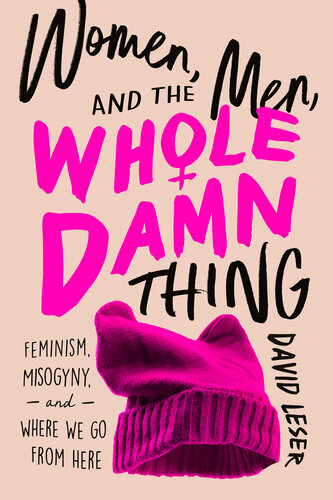
Women, Men, and the Whole Damn Thing
Feminism, Misogyny, and Where We Go From Here
- اطلاعات
- نقد و بررسی
- دیدگاه کاربران
نقد و بررسی

Starred review from September 21, 2020
Journalist Leser (To Begin to Know) surveys “universal crimes against women” in this searing, deeply reported account. “It’s here, there, and everywhere,” Leser writes about sexual harassment, “coded into the system and architecture of where we work and how we live.” He credits the #MeToo movement for allowing women “to describe the not-so-alternative reality they have always inhabited,” and documents abuse and rape allegations against Harvey Weinstein, Louis C. K., Irish rugby players Paddy Jackson and Stuart Olding, and other prominent men in the U.S., Europe, and Australia. Leser also points out misogyny in Jewish prayers, the New Testament, and the works of Aristotle, and cites shocking statistics about discrimination, harassment, and sexual violence (“In America, a woman is raped every 9 seconds and a rape is reported every 6.2 seconds”). He interviews women’s rights activists including Zainib Salbi, founder of Women for Women International, and playwright Eve Ensler, talks with his daughter about her first sexual encounters, and casts a critical eye on his own behavior and attitudes. Leser’s fluid writing style and emotional honesty will keep readers from sinking into despair, despite the heaviness of the material. This powerful call to heal the “collective wound” of misogyny resonates.

A veteran Australian journalist looks at the ramifications of the modern fight against sexual violence that led to a global moment. Though Leser's daughter warned against writing about the #MeToo movement--perhaps the moment didn't call for the voice of "a straight, white, middle-class male who has breathed the untroubled air of privilege all my life"--the author persisted, seeking to understand "the mess of human relations and how they're played out in real-life situations." Leser capably lays out the origins of misogyny, exploring how it is baked into the religion, philosophy, and culture of societies around the globe and illustrating the horrific results for both women and men--how it "obliterates women and girls" as well as "weaker men, more feminine men, gay men, different men, transgender men and, of course, children in all their divine innocence." Given the author's unflinching examination of the life-threatening nature of misogyny, readers may be confounded by his discussion of the impact of #MeToo on heterosexual flirting and the "try-on.": "I hope men never lose the best ways of trying it on. Because, if we do, women will never be asked out, babies will never be born and, never mind climate change, the human race will cease to exist." Leser gives considerable platform to controversial statements from second-wave feminists (e.g., his friend Helen Garner) who find some aspects of the third-wave view of consent--such as the desire not to be surprised by unwanted touching--reflective of "entitlement." The author also gives too little attention to the beginning of #MeToo as a response to sexual violence against Black women and girls, though he briefly credits activist Tarana Burke, a Black activist, with creating the movement. Unfortunately, the narrative too often centers Whiteness, warns against too much anger, and eulogizes romance as a response to an overdue reckoning against misogyny. A candid look at the devastating global effects of misogyny undermined by concerns about a feminist revolution gone too far.
COPYRIGHT(2021) Kirkus Reviews, ALL RIGHTS RESERVED. (Online Review)




دیدگاه کاربران